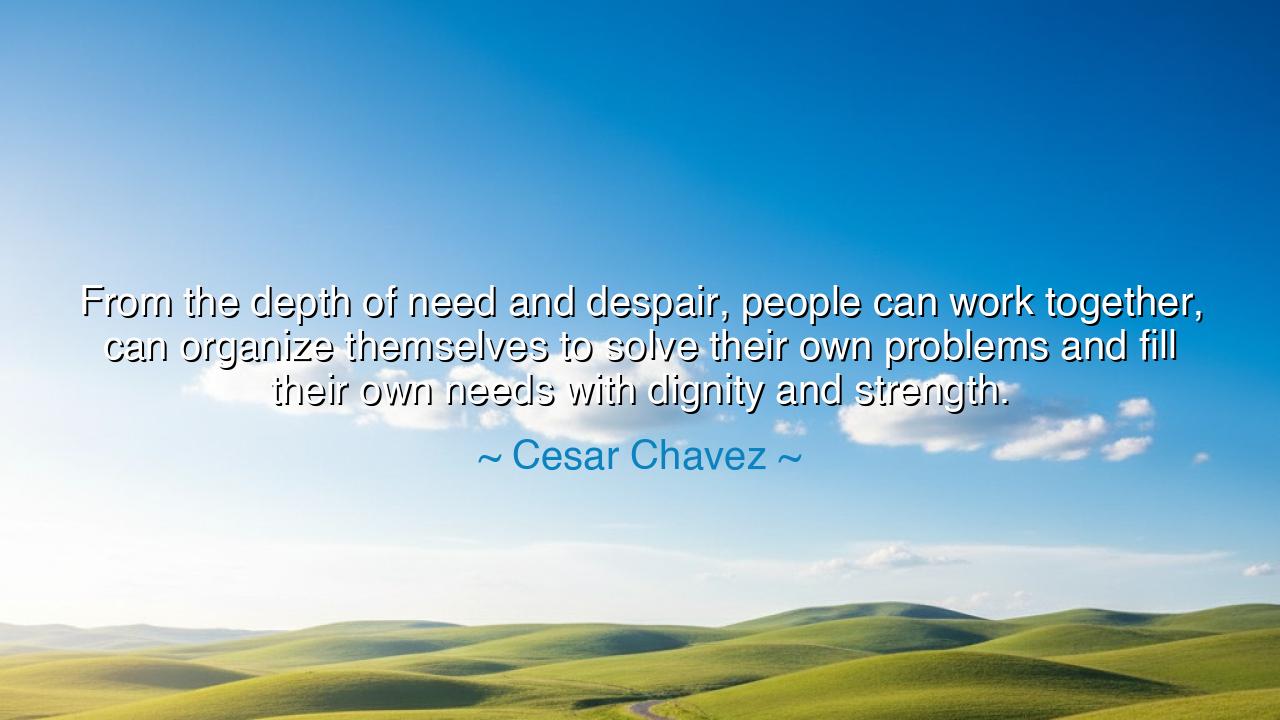
From the depth of need and despair, people can work together
From the depth of need and despair, people can work together, can organize themselves to solve their own problems and fill their own needs with dignity and strength.






Hear the words of César Chávez, spoken as both a cry of suffering and a hymn of hope: “From the depth of need and despair, people can work together, can organize themselves to solve their own problems and fill their own needs with dignity and strength.” This saying is not the idle thought of a philosopher in comfort, but the hard-won wisdom of one who walked among the weary, the poor, and the broken. In his voice we hear the ancient truth—that even in the darkest valley, when the hand of oppression presses down, men and women can rise not through charity given from above, but through unity forged from below.
The origin of these words is rooted in the struggles of farmworkers in America, laborers who bent beneath the sun, gathering food for others while their own families went hungry. Chávez, born of such hardship, saw firsthand how despair isolates the individual. But he also saw the seed of transformation: that when the oppressed joined hands, their weakness became strength, their despair became resolve. Thus arose the United Farm Workers, not as a gift from the powerful, but as the creation of the powerless who chose to stand together. His words echo the eternal teaching that dignity does not come from wealth or privilege, but from the courage to claim one’s worth in the face of injustice.
History bears witness to the same law. Recall the story of the Hebrew slaves in Egypt, who labored under Pharaoh’s lash. Alone, they were beaten, voiceless, forgotten. But when united by a common faith and led by a common vision, they rose, crossed seas, and became a nation. Their strength did not lie in their weapons, for they had none, but in their unity, their belief that they were not destined for despair but for freedom. Just as the farmworkers of Chávez’s time organized in their fields, so too did the ancient Hebrews organize in their exile, proving that out of the depth of need comes the birth of strength.
The heart of Chávez’s wisdom lies in the union of two forces: dignity and strength. Strength alone may bring rebellion, but without dignity it breeds only rage and destruction. Dignity alone may inspire patience, but without strength it collapses into submission. When people join these two together—refusing to bow in shame, yet refusing to strike in hatred—they find the balance that builds movements which endure. It is not the despair itself that redeems, but the response to despair: the choice to stand together, to solve problems with hands and hearts bound as one.
These words are not only for workers in the fields; they are for all who feel crushed by life’s burdens. There will come times when despair whispers that you are alone, that no one sees your suffering. In those moments, remember Chávez’s teaching: you are never powerless if you are willing to join with others. In friendship, in community, in shared purpose, the smallest voices become thunder. Just as drops of water form the ocean, so too do scattered lives form a tide of change when they unite.
Consider the example of the civil rights movement in America. Rosa Parks sat alone upon a bus, but her defiance inspired a people to rise together. Martin Luther King Jr. spoke with a single voice, but behind him stood millions who marched, sang, and endured imprisonment. Alone, they could be silenced; together, they shook the conscience of a nation. This is the pattern Chávez proclaims: that despair is the soil from which collective hope can grow, if only people choose to plant it.
The lesson for us is clear. Do not wait for saviors from beyond; organize with those beside you. Do not surrender to despair, but let it be the fire that forges unity. When challenges arise—whether in work, in family, in society—resist the temptation to bear them alone. Seek out others, share the burden, and together shape solutions. In unity there is dignity, in dignity there is strength, and in strength there is the power to transform despair into victory.
So, O listener, let these words dwell in your heart: you are not weak, though you may feel powerless. You are not voiceless, though you may feel silenced. You are not alone, though despair may whisper otherwise. For when people bind their destinies together, they rise higher than kings, stronger than armies, greater than fear. And in that rising, they prove that from the depths of need, humanity discovers its noblest strength. This is the eternal law, passed down by the ancients, and lived again in the fields where Chávez walked.






AAdministratorAdministrator
Welcome, honored guests. Please leave a comment, we will respond soon